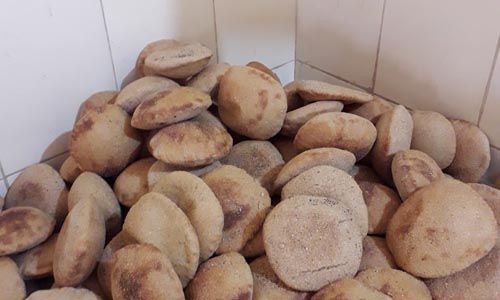In 2010, the Bombay High Court had directed all village panchayats to create composting facilities for bio-degradable waste within their limits and make arrangements for weekly collection of non bio-degradable waste. The court also ordered all the municipal councils to acquire land for landfill sites to dump garbage. Clearly, there is a need to wake up to the reality of the garbage problem compounded many times over by the large number of tourists.
February 17-23, 2014
Lionel Messias
She ‘shoots off’ press notes on issues, none of which concern us in the constituency (Cortalim). Garbage dumping in Velsao (Velsao-Pale-Issorcim village panchayat) and Cansaulim villages is happening after she became MLA. Her presence as the constituency legislator is evident only by the almost weekly pictures of her in the newspapers. Example: in December she was present when the foundation was laid for the proposed Mapusa Police station building. These are just some of the many refrains on Alina Saldhana, Cortalim constituency MLA by default, one hears, everywhere one goes these days. The Velsao-Pale-Issorcim village panchayat is one among the six panchayats in Cortalim constituency.
If Alina were a student, instead of the teacher she is, the sum of all her minus points accumulated against her, would have held her back in the same class she attended at the beginning of 2012.
Her closest supporters in fact, were disappointed with the ministerial post Chief Minister Manohar Parrikar gave her; because her late husband Mathany Saldhana would certainly have got the tourism ministers post in addition. Indeed, he was tourism minister in an earlier government of Parrikar. But as it turned out, the one ministerial post she got was a wasted opportunity.
Velsao's garbage collection plan dumped
In November 2012, the Velsao panchayat was chosen to be the first to have a door to door collection of dry waste as part of a pilot project of the Department of Science, Technology & Environment (which she heads) in collaboration with the Directorate of Panchayats. Speaking then, Alina Saldanha (the environment minister with independent charge that too) said after trying out the system for a month, she would take it to other panchayats as well. "We are starting a system of dry waste collection in all the wards of the village panchayat. We are helping the panchayat to construct a shed, the work on which should start in two weeks time and should take another two weeks. In a month's time the system will be up and running," she had said.
Nothing happened.
Alina Saldanha also made a simple proposal look complex. She said the system involved collecting dry waste, loading it onto a rickshaw, and taking it to the shed. "We are in the process of finding a contractor to run the rickshaw. We are also in the process of talking to contractors to see whether we have to segregate the waste and give it to them or, they have to segregate the waste after collecting it." In the same breath two contractors were shortlisted.
According to the government, the system covers only dry waste and not wet waste, as it expects people to set up their own composting units. The contractors who collect the dry waste are expected to either recycle it or dispose-off non recyclable materials in a "proper scientific manner". According to the minister, panchayats which had previously identified sites for garbage management but had them rejected by the Goa State Pollution Control Board (GSPCB), should re-submit their applications as they would now only be collecting and managing dry waste which is perceived to be less of a problem as compared to mixed or wet waste.
No thought of course was given to residential buildings, big and small, and gated communities; all of which considerably outnumber individual houses with a patch of land to spare for composting units. As a matter of fact, this is the scenario that is emerging in Goa (and growing at a hurried pace). The express pace with which massive buildings are being built on the entire stretch of NH 17A is a case in point.
Also, while most panchayats have the funds to carry out door to door collection of dry waste, the government annual funding of Rs. 50,000 is absurdly small. Even, if as expected, this is to be increased to Rs. 1,00,000 in the next financial year, clearly this will not cover actual costs for even a 4-5 month period.
Velsao-Pale-Issorcim VP, dead as a Dodo
In 2010, the Bombay High Court had directed all village panchayats to create composting facilities for bio-degradable waste within their limits and make arrangements for weekly collection of non bio-degradable waste, which includes plastics. The court also ordered all the municipal councils to acquire land for landfill sites to dump garbage as provided in the Municipal Solid Waste Rules of 2000.
On April 19, 2012 the GSPCB told the High Court that it would carry out a fresh inspection of garbage disposal facilities in all coastal panchayats and municipal councils in the state within eight weeks during the hearing of a suo motu petition, through which the court had been monitoring garbage disposal in the state. The hearing was with regard to contempt proceedings against panchayats that had not complied with the court's interim orders on garbage disposal (the last date for submission of the compliance reports was May 31, 2012).
On July 30, 2003, the high court had in actual fact issued several directions for disposal of garbage as per the Municipal Solid Waste Rules. Thereafter, on October 3, 2007, the court had taken suo motu cognisance by issuing notices to 26 coastal panchayats for examining compliance to its earlier orders. Several panchayats and municipal councils had not complied with court orders and as a result were in contempt of court even then (that is, before May 31, 2012). The Velsao-Pale-Issorcim panchayat was one of the four that failed to comply with the orders.
So what really has the environment minister achieved till date, notwithstanding the appetite of the panchayats to do nothing except to allow the unabated construction much against the will of the people, proof of which are the many gram sabha resolutions against construction of gated communities? Till very recently, the two panchayats had a total of three tricycles pressed into service to collect dry waste! All things considered, the answer to that is nothing. And as it happens so frequently in the Goa, the Bombay High Court has done far more than successive governments have done in matters that cover Good Governance and Human Rights.
According to Clintan Vaz, a garbage disposal consultant, "The court stepped in where the government failed." However, since the matter has taken four years and it is still not resolved, it has resulted in confusion."
Only HC had success till date
Coastal Village panchayats have been given directions while the rest of the panchayats do nothing. Panchayats like Taleigao and Navelim are heavily urbanized yet have no disposal system, and so their residents use neighboring cities as their dump sites.
According to him, compliance sounds easy on paper, but is difficult in reality. The GSPCB also gives further directions which makes it difficult to achieve. For example, when the Varca panchayat was asked to build composters and start door to door collections to comply, it did that over a three month period in 2012. However, the PCB next said that the collection frequency had to be increased, and a calculated quantum of waste had to be achieved. One hundred per cent compliance is also not possible as some homes are used as rentals or guest homes and are therefore closed for most of the year. Furthermore, once the collections were done, the government and the PCB had no disposal points for collected waste until recently. Also, the government contractors refuse to collect items like thermocol, tube lights, ceramics and glass.
Many panchayats managed or rather contrived to get partial compliance by either using political pressure or filing false affidavits. The Benaulim Panchayat is an example where false information was submitted to both the PCB and the court, as a result of which it could obtain partial compliance without having the regulatory composters or any door to door collection that reaches even 20 per cent of the total village population.
Clearly, there is a need to wake up to the reality of the garbage problem compounded many times over by the large number of tourists descending on Goa. According to Vaz, three things need to be done urgently. "The court should re-examine the whole matter focusing on the latest issues and then give fresh directions to every panchayat." We need these directions to be complied with within shorter time-frames, and for the PCB to participate with workers trained in solid waste management collection systems. The government should also realize that while the collections will start eventually, the treatment and disposal systems also need to fall into place simultaneously.



